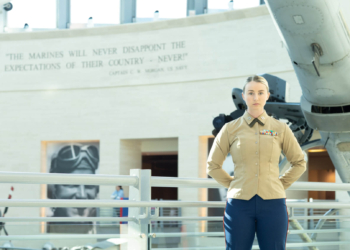Many military spouses can relate to the struggle between balancing the unpredictable schedules of military life with the high demands of college coursework. Add in deployments and Permanent Change of Station moves, attaining a college degree as a military spouse can seem like a nearly impossible task.
Yet many have done it. I’m one of them.
I was lucky to complete my bachelor’s degree before marrying my service member. But I still hit an employment wall at our first duty station together. I was “overqualified” for entry level positions, but had no local contacts to recommend me for higher positions. While working as a secretary, I decided to take advantage of my employer’s tuition assistance program to start my master’s degree. I signed up for my first class just after learning I was pregnant with our first child. My thought was, life was never going to get any easier. I was right.
Three years later, after one PCS move, two deployments and two additional pregnancies, I finally completed my master’s. It wasn’t easy, but it also wasn’t impossible.
I interviewed dozens of successful spouses who all earned a college degree while married to a service member. Their stories were different, but each one was inspiring. Here are some highlights:
What types of college degrees work best with the military spouse lifestyle?
I spoke to spouses earning an associate, bachelor’s or master’s degree, and even PhD candidates. Not surprisingly, most spouses told me they were pursuing a college degree online or through a distance program. Since the military can move families frequently, it’s smart to choose a program that is flexible. Hands-on programs, like nursing, can be difficult to achieve through distance programs, especially for spouses stationed overseas. Some spouses in traditional programs choose to live separated from their service member temporarily so that they can complete classes.
What unique obstacles do military spouses face when pursuing degrees?
So many. Of course, there are somewhat expected challenges like deployments and PCS moves. Each spouse overcomes these in their own way. Some choose not to move with the service member. Others use deployments to focus on their education. But here are some lesser-known challenges that spouses shared with me:
- Time zone differences can be a major challenge for spouses stationed overseas. Not only do they need to order books and submit assignments early, but some described setting alarms for the middle of the night to participate in live seminars or class discussions.
- Taking time off from college to marry a service member can leave spouses intimidated about returning to school as an older student. Kim R. shared the challenge of having a 13 year gap between leaving college and finally completing her associate’s degree.
- Professional licenses in law, teaching and nursing must be renewed every time the spouse moves to a new state. Although recent laws have made this process smoother, it can still be costly and leaves a career gap with each PCS move. Grace worked hard for a degree in Marriage and Family Counseling, but since moving has been unable to find employment due to licensure restrictions.
- Traditional coursework fosters networking and community. Students who complete a college degree online need to be more proactive in seeking and building professional relationships.
- Many PhD programs have required visits or residency requirements that are not compatible with being stationed overseas or with unpredictable military training schedules.
- Raising children alone can be a strain on military spouse students during deployments.
- Legislation can negatively impact military spouse employment. Athena, a recent graduate with a BSN won’t be able to work as a nurse at their next overseas base until the current hiring freeze is lifted.
How are military spouses crushing those obstacles?
Flexibility, creativity and persistence are key for any military spouse pursuing a degree. I spoke with spouses who overcame a variety of challenges, from special needs children to overseas duty stations to numerous deployments. Every one of them earned at least one degree. And several older spouses had earned multiple degrees in their time as a military spouse!
- Anna, a 16-year military spouse and former military ‘brat,’ spent years searching for a more flexible program for a master’s degree in nursing. She finally found one that was compatible with living overseas.
- Melissa, a spouse with three degrees, realized that her dream of becoming an MD would not work with frequent military moves. She switched her educational focus to counseling and now runs a successful company called Stars and Stripes Doulas.
- Rosette, a doctoral candidate, earned a master’s degree and several professional certifications by focusing on programs lasting less than two years, which were available through military base locations.
- Rebekah, a special needs parent, earned a master’s degree online during numerous deployments. She completed assignments in doctor’s offices or on the sidelines at sports practice, trying to keep everything on her phone so she could be flexible and maximize her time.
- Jessie completed classes during a PCS move. Although there was sometimes trouble finding a good wi-fi connection, having teachers who allowed her to work ahead and submit work early helped her stay on track.
- Alana scheduled distance classes around military moves. Taking time off during an occasional session allowed her to focus on major life changes like PCS moves and deployment, without getting too far behind in her coursework.
- Nichole, aka Dr. Weakley, chose not to move with her service member for the first six years of their marriage, but when they were surprised with a daughter, she raised her alone for two and a half years.
- Danielle, a nutritional counselor and health coach, signed up for her master’s degree with two young children. Living far from family, she relied on the base CYS for affordable childcare.
Is there a balance between military life and education?
Most spouses admitted that there is no magical balance between military life and education. Pursuing a college degree is something that you need to be devoted to, even when military life is distracting. One spouse defined it as getting through by “sheer willpower, seriously.” Another said living geographically separated while raising a child, being a student and working felt like “trying to keep three spinning plates in the air without falling.” Spouses carve out time late at night when kids are asleep. They use the base library to complete assignments. They become masters of prioritizing, organization and time management.
What motivates military spouses to earn degrees?
Although they all admitted that getting a degree was challenging, each military spouse insisted it was worth it.
Some are motivated by passion for their degree field or a desire to break the glass ceiling. For others, the need for a degree is concrete. They plan to support the family on their professional income after the service member retires. Others — like Melissa who was a teen mom — want to earn a degree to provide better opportunities for their children.
Another parent wrote, “My son has Type 1 diabetes and will be insulin dependent his whole life. When my husband leaves the military, I want to find good employment where I can afford insurance.”
For some military spouses, pursuing a degree is just fun. One said, “With my kids back in school, it’s time to refocus myself professionally.”
Another spouse who already earned a PhD, is back in school again. She said, “My current school adventure is really more for fun and additional specialization.”
Finally, there is always the motivation to make the best use of financial aid. One spouse who completed her master’s with a 3.88 GPA said, “Knowing what my husband had to go through to earn the GI Bill money meant that failure was absolutely not an option.”
Read comments






































